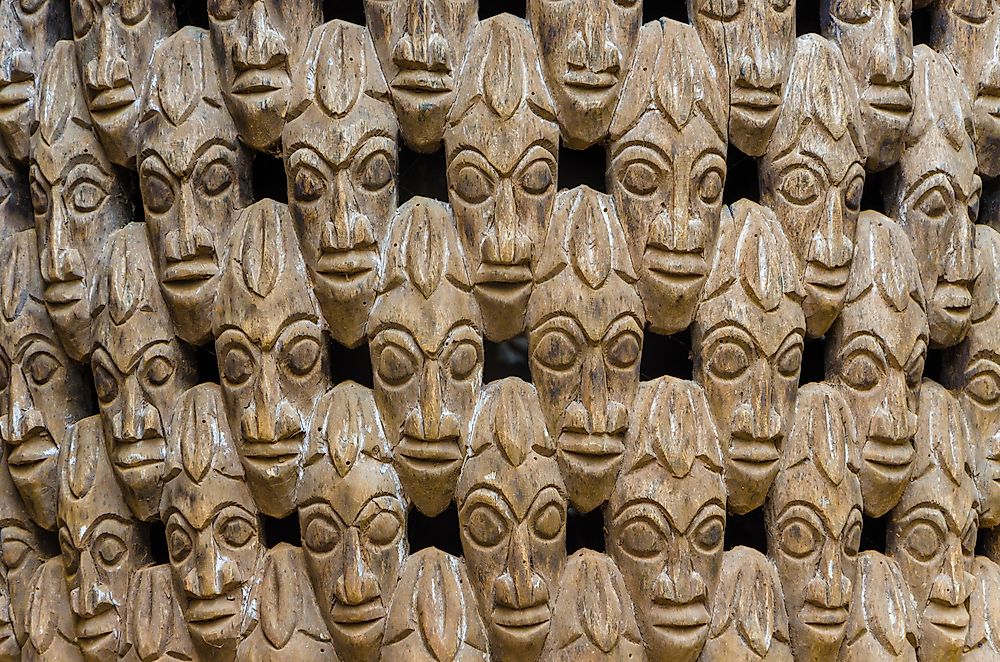The Culture Of Cameroon

Cameroon is located in West-Central Africa where it occupies a total area of 475,442 square km. The country hosts a population of 25 million individuals.
Ethnicity, Language, And Religion
Cameroon has a multi-ethnic population. The largest ethnic communities living in the country are the Cameroon Highlanders, Equatorial Bantu, Kirdi, Fulani, Northwestern Bantu, and the Eastern Nigritic peoples. French and English are the official languages of Cameroon. Each ethnic community of the country also speaks their respective languages. Christianity is the religion of the majority. Roman Catholics and Protestants account for 38.4% and 26.3% of the country’s population, respectively. Muslims represent 20.9% of the population. Many of the inhabitants of Cameroon also practice their indigenous African religions.
Cuisine
Cameroon has one of the most diverse cuisines in Africa due to its location at the crossroads of many cultures. Cassava, yams, rice, potato, sweet potatoes, millet, maize, and rice are some of the staple foods of Cameroon. Fish is the most common source of protein in the diet. However, beef and poultry are also consumed. Bushmeat was more popular in the past than now. Meats of the giant rat, porcupine, and pangolin were highly valued. Even gorilla and chimpanzees were not spared. Most of these animals are now protected but the illegal trade of the bushmeat continues to exist. In some parts of Cameroon, especially in the forested areas, insects are also consumed.
Clothing
The traditional attires of Cameroon's population vary depending on the landscape and climate of the country. In the northern regions, Muslims live in large numbers, and a hot and arid climate prevails. The people here generally adorn vibrant, light-weight, and free-flowing robes, and head coverings. The garments are usually richly embroidered. In the southern part of the country (a predominantly Christian population and large forested landscapes), people usually wear multi-layered embroidered clothing.
Literature, Art, And Craft
Cameroon, like most African countries, has a strong tradition of storytelling. Prior to colonial rule, only oral literature existed in the country. It was in the form of folk tales and legends, magic formulas, rituals, heroic epics, poems, war stories, etc. During the colonial period, the spread of formal education led to the production of written literature in French and English. Today, Cameroon has a rich collection of published works.
The craftsmen of Cameroon are highly regarded for their crafts which have both decorative and functional values. Sculpting, beadworking, calabash carving and painting, embroidery, basket-weaving, bronze and brass working, leather working, pottery, etc., are some of the famous craft works from the country.
Performance Arts
Music and dance are an integral part of the nation’s culture and have a significant presence in the Cameroonian festivals, social gatherings, and ceremonies. Usually, men and women dance separately. The dances are performed to either entertain or for religious purposes. Folk music is produced using a variety of traditional musical instruments including drums, flutes, horns, scrapers, stringed instruments, whistles, etc.
Sport
The people of Cameroon take great interest in a wide variety of sports. The government of the country also supports many sports activities and competitions held in Cameroon. Some of the popular traditional Cameroonian games include wrestling, swimming, canoe racing, and tug of war. Wrestling has traditionally been used as part of the initiation rights ceremony of several Cameroonian tribes. Sports like basketball, netball, table tennis, boxing, and cycling are currently quite popular in Cameroon. However, football is the most widely played sport. It is played both professionally and informally in the country’s towns and villages. The national football team of Cameroon is internationally recognized for its good performances at international competitions. Hiking, rock climbing, and mountaineering are some of the outdoor activities that can be experienced in the country. Rugby is also a very popular spectator sports in Cameroon.
Life and Society
In the traditional Cameroonian society, men generally have a higher status than women. They enjoy greater rights in terms of marriage and divorce. They also have greater access to education and employment. Women are usually assigned the role of managing the household chores and children. In rural areas, women also engage in agricultural activities like growing the staple food crops. Men in rural areas cultivate cash crops, clear the land, tend to livestock, hunt, and fish, etc.
Marriages are still arranged by the family members of the bride and groom but marriages based on individual choice are also becoming more common. Polygamous relationships are not uncommon. Men usually prefer to marry more than one woman but often financial constraints prevent them from doing so. Most rural households are headed by the oldest male member. He lives with his wives and children. They live together with each wife and her children living in a separate dwelling within one large compound.
Children are highly valued in society. Couples usually have several children. Mothers and other female relatives take care of the infant. Cameroonian children are taught traditional skills, social values, customs, and rituals since an early age. Boys often accompany their fathers to work while girls help their mothers with household and agricultural duties. In rural areas, quality education is often not accessible to children. Schools are usually located at great distances and the students need to travel for several hours to attend school. Education in the urban areas is, however, far more accessible.
Greetings are considered important in the Cameroonian society. People are expected to greet others with a handshake and using their proper or praise names. Serving and receiving food graciously in an important aspect of the country’s culture. Elders are highly respected and their advice is valued.











